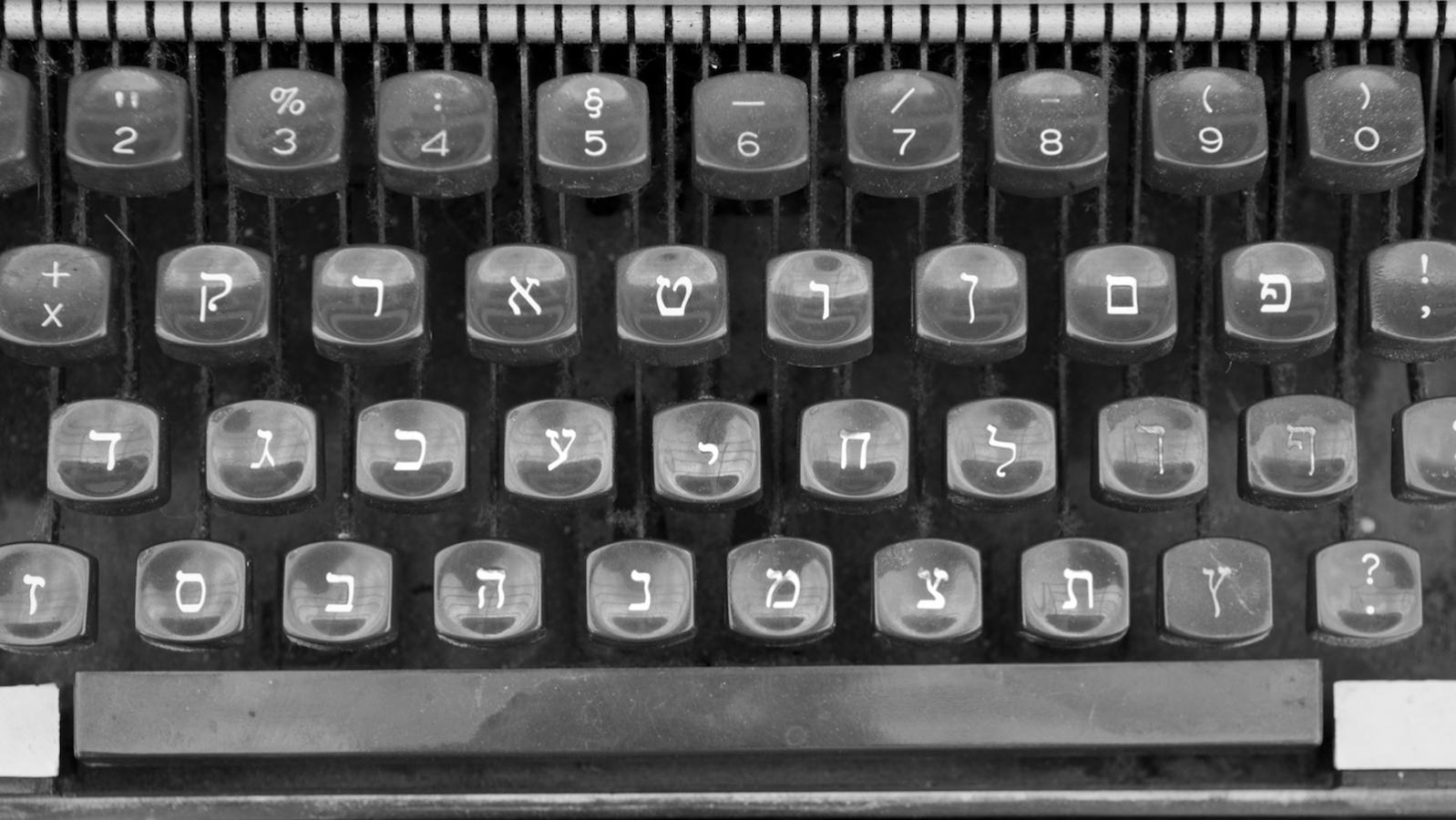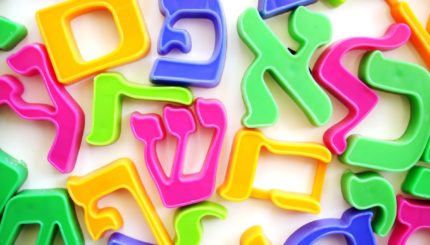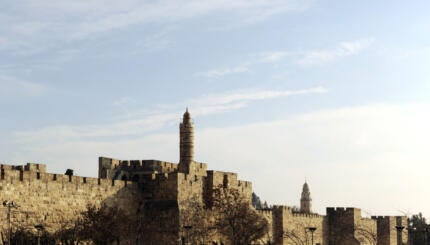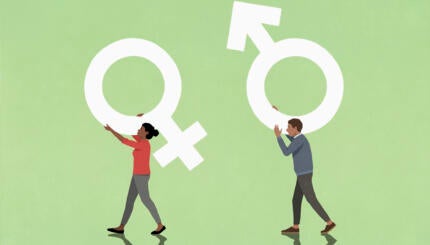Approximately 5,000 books are published annually in Israel. Considering that Hebrew books are from a small country and in a relatively obscure language, they are often translated into English at an astonishing speed. Within two to three years of their initial publication, novels by prominent Israeli writers such as Amos Oz and A.B. Yehoshua appear on shelves at American bookstores and on the pages of The New York Review of Books.
Looking for the latest Hebrew literature in translation? Find catalogues detailing which Israeli books have been translated recently and which titles are in the works.
While not all Hebrew books appear in English as quickly as these Israeli best sellers, readers in English can sample the richness of modern Hebrew literature, particularly novels and short stories, through the many works currently available in translation.
Beginnings of Modern Hebrew Literature
Modern Hebrew literature first emerged in Europe during the late 19th and early 20th centuries. Few of these classics are still in print, but several notable writers are featured in recent books and reprints.
With your help, My Jewish Learning can provide endless opportunities for learning, connection and discovery.
READ: 7 Female Israeli Writers You Should Be Reading
Chaim Nachman Bialik (1873-1934) is one of the best known poets of the late 19th century and early 20th century renaissance of Hebrew literature. His rich and complex poetry, presented in translations such as David Aberbach’s C.N. Bialik: Collected Poems, explores radical changes in Eastern European Jewish life, biblical themes and the beauty of the natural world.
Yosef Chayim Brenner (1881-1921) was among the first generation of Hebrew writers in the Yishuv (the Jewish community in pre-state Palestine). Perhaps his best known work is Breakdown and Bereavement, a novel that traces the unraveling of an aspiring pioneer.
While Bialik and Brenner are mainstays of the Hebrew canon, a more surprising figure to find in English translation is Devora Baron (1887-1956). Baron wrote one novel and many intricate, lyrical short stories–often set in small towns in Eastern Europe–that have been collected in “The First Day” and Other Stories, translated and edited by Naomi Seidman and Chana Kronfeld.
Sly Modernists and Fervent Zionists
By the 1930s, the center of Hebrew literature had shifted from Europe to the Jewish community in Palestine. In the decades before and after the founding of the state of Israel, there is immense variety in Hebrew literature, mixing new and old literary themes and techniques.
S.Y. Agnon (1888-1970) was one of the most celebrated Hebrew writers of the twentieth century, and the only Israeli to receive the Nobel Prize for Literature. Among his best known works are A Guest for the Night, which narrates the protagonist’s return to his Galician town after the destruction of World War I, Only Yesterday, a sprawling social and psychological portrait of the Second Aliya, and his many short stories, collected in A Book That Was Lost and Other Stories.
In contrast to Agnon, Chayim Hazaz‘s (1898-1973) modernist stories and novels are often explicitly ideological, examining different social and historical aspects of Zionism. In the story “The Sermon,” from the collection The Sermon and Other Stories, his characters reject Jewish life in the Diaspora and envision a new Jewish nation, free of the neuroses of previous generations.
Aharon Megged (1920-2016) often writes about the powerlessness and disillusionment of his generation. One of Megged’s best known novels, The Living on the Dead, questions the existence of heroism in Israeli society. A more recent book, Foiglman, examines conflicted relationships between fathers and sons, Israel and the Diaspora, and Hebrew and Yiddish.
The New Wave

From the early 1960s, Israeli fiction has been filled with complex characters alienated from society and the land. Though writers such as Yehoshua Kenaz and Binyamin Tammuz are not easy to find in translation, many others writers of the time are well-represented in English.
Yehuda Amichai (1924-2000) is one of the best known and most beloved Israeli poets. His work has been translated into more than 20 languages, from Albanian to Turkish. His lyrical poetry and prose use everyday language to create vivid, poignant images and capture complex emotions and experiences, both in his early poetry, represented in the translated collection The Selected Poetry of Yehuda Amichai, and in his final book, Open Closed Open: Poems.
Many of Amos Oz‘s (1939-2018) novels reveal the dark underside of life and the psyche. In The Hill of Evil Counsel and My Michael, for example, passion and family dysfunction are narrated from very different perspectives, one of an adolescent boy during the British Mandate, the other of a women in 1950s Jerusalem.
A.B. Yehoshua, (1936-) another prominent contemporary Israeli novelist, has written a wide range of books, from A Journey to the End of the Millennium, which chronicles a family’s voyage through medieval Ashkenaz, to A Woman in Jerusalem, which focuses on the circumstances surrounding a woman’s violent death.
The majority of Aharon Appelfeld‘s (1932-2018) novels and novellas focus on the Holocaust, both the events leading up to the genocide and its lasting legacy. In clean, calm prose, he sketches a vibrant Jewish community that ignores the looming signs of disaster in Badenheim 1939. Other works, such as The Iron Tracks and The Immortal Bartfuss, feature characters who wrestle with the physical and psychological scars of the Holocaust.
Surprisingly, Yoram Kaniuk’s (1930-2013) work is available in English, even though he has long been on the margins of Hebrew literature. Kaniuk writes innovative fiction that mixes the fantastic and the grotesque, including the exploits of Holocaust survivors in Adam Resurrected and Jewish identity and collective memory in The Last Jew.
Changing Society, Changing Literature

In recent years, Hebrew literature has reflected the increasing fragmentation of Israeli identity and society. Writers like Anton Shammas, Sami Michael, and Dorit Rabinyan represent the changing face of the Israeli author, while the works of writers such as David Grossman and Meir Shalev challenge traditional narratives about Israeli history and Zionism.
Though not always easy to find in print, Sami Michael‘s (1926-) novels represent the emergence of mizrahi writing, work by Jews from Arab lands. Among Michael’s many novels, Refuge chronicles the complex relationships between Jews, Arabs, and Arab-Jews, while A Trumpet in the Wadi narrates a love affair that crosses boundaries between Jew and Arab.
Yoel Hoffman (1937-) weaves together experimental and fragmented language with elements of Buddhism and Western philosophy into books such as the dream-like love story, The Heart is in Katmandu, and the complex mixture of reality and fantasy, Katschen and the Book of Joseph.
Haim Be’er‘s (1945-) acclaimed novels, Feathers and The Pure Element of Time, are often described as Israeli magic realism. Both books explore life in religious communities in Jerusalem, leaping between past and present, comedy and the macabre, and wholeness and fragmentation.
Several of Batya Gur‘s (1947-2005) popular mysteries, featuring Jerusalem police office Michael Ohayon, have been translated to English. From her first novel, The Saturday Morning Murder, to her final book, Murder in Jerusalem, Gur’s work combines the suspense of classic detective narratives with deft portrayals of Israeli characters and society.
Journalist and writer David Grossman (1954-) takes on some of the most sensitive subjects in Israeli society in his novels, including the legacy of the Holocaust, in the brilliant See Under: Love, and the disillusionment of a young soldier, in The Smile of the Lamb.
Palestinian-Israeli writer Anton Shammas (1950-) provoked a major controversy in Israel in 1986 when he published the Hebrew novel Arabesques, an exploration of Palestinian identity that weaves together personal stories, history, and fantasy into a rich and dense narrative.
Zeruya Shalev‘s (1959-) popular novels focus on family dynamics in Israeli society andthe pressures of marriage. With lyrical prose and deep psychological insight, books like Husband and Wife investigate the mind and desires of contemporary Israeli women.
Orly Castel-Bloom (1960-) has written many stories and novels that capture the fragmentation of contemporary Israeli society. Her satirical novel Human Parts chronicles the exploits of a series of complex women, offering a fascinating portrait of Israeli life with a strange and often surreal sense of humor.
One of the best known Israeli writers to emerge in the 1990s is Etgar Keret (1967-), whose stories, children’s books, and graphic novels have been extremely popular. His short-short stories, collected in Bus Driver Who Wanted to Be God and Other Stories and The Nimrod Flipout: Stories, are filled with cynicism, humor, irony, sexuality, and Israeli pop culture.
Deftly evoking Jewish life in Iran in Persian Brides and Iranian families in Israel in Strand of a Thousand Pearls, Dorit Rabinyan‘s (1972-) lyrical novels offer rich emotional portraits of family life, especially the psychological and emotional dimensions of female characters.
Sayed Kashua (1975-) is a writer and journalist whose work focuses on Palestinian life in contemporary Israel. His first novel, Dancing Arabs, features the protagonist’s struggles as he moves from childhood and adulthood and navigates Palestinian and Israeli culture.
There are many more Hebrew writers who could be added to this diverse list, and many others who will hopefully be translated into English in the near future. Other rich sources of Hebrew literature in translation include the many anthologies of prose, such as the classic Modern Hebrew Literature and the more recent Oxford Book of Hebrew Short Stories, as well as collections of poetry, like The Penguin Book of Hebrew Verse, The Modern Hebrew Poem Itself and The Defiant Muse: Hebrew Feminist Poems From Antiquity to the Present.
Tammuz
Pronounced: tah-MOOZ (oo as in boot), Origin: Hebrew, Jewish month that usually coincides with June or July.
Yehuda
Pronounced: yuh-HOO-dah or yuh-hoo-DAH (oo as in boot), Origin: Hebrew, Judah, one of Joseph's brothers in the Torah.



